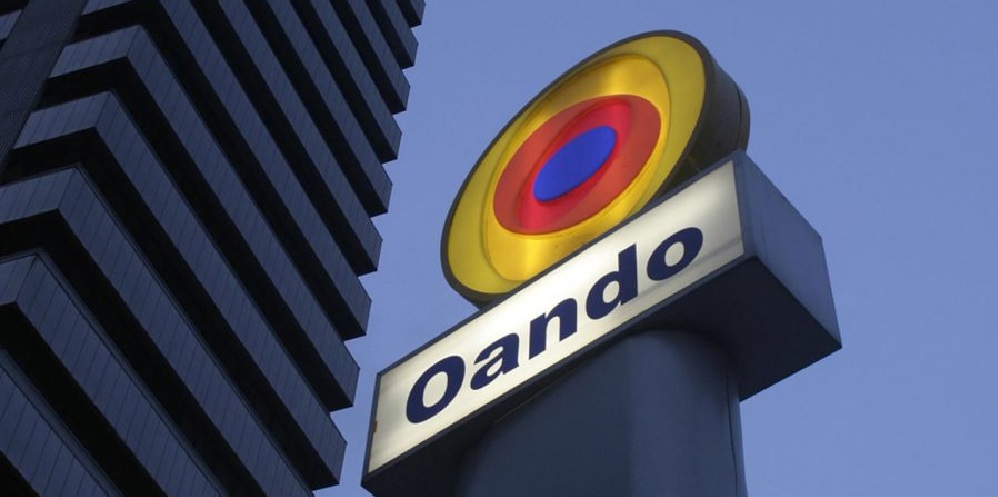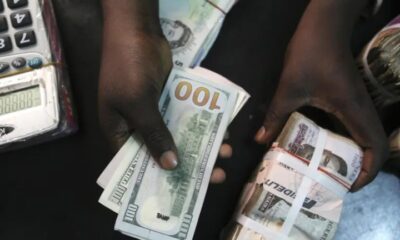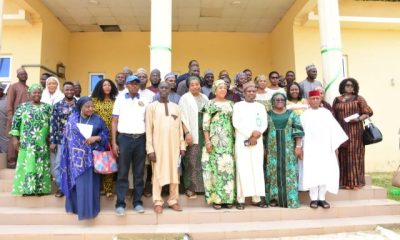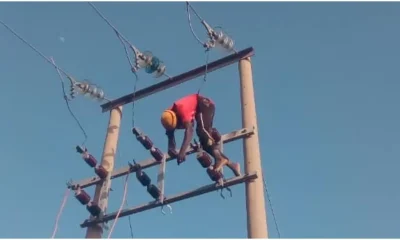Economy
Oando denies owning blending plant in Malta

Oando PLC has denied allegations on social and digital media that it owns a blending plant in Malta.
The energy company also denied importing dirty fuel into Nigeria through a Maltese company, Raz Hansir Oil Terminal Limited.
A statement by the company secretary, Ayotola Jagun, said the allegations levelled against Oando of being a shareholder, and its principals of being board members of Raz Hansir Oil Terminal Limited, a company that operates an oil storage and blending facility responsible for importing adulterated petroleum products into Nigeria, were unfounded.
“We wish to refute such claims and attest that neither Oando PLC nor its Executives have ever held shares, investments, or interests in the fictitious Maltese company.
“As part of a comprehensive investigation into the basis of the false claims, we conducted a search of the Malta Business Registry, the official repository for all registered entities past and current within the country. Our search yielded no results for a company bearing that name. Subsequent due diligence efforts similarly failed to uncover any record of the company’s existence.
“We therefore believe that the false claims are of the malicious intent of misleading the public and our stakeholders,” Jagun stated.
The company reiterated that as a publicly listed company, any corporate actions, such as acquisitions, are declared publicly in accordance with applicable corporate governance laws and rules.
“Furthermore, it is imperative that information released about a publicly quoted company such as Oando, is thoroughly researched and deemed accurate before it is published in the public domain.
“The company’s securities are traded daily across two exchanges (NGX and JSE). To prevent misinformation and confusion among investors, as well as our other stakeholders, we implore all members of the press to take adequate steps to ensure the veracity of reports by fielding all enquiries with Oando PLC’s Corporate Communications department,” Jagun submitted.
Malta and its oil became a topic of discussion lately following allegations by the President of the Dangote Group, Alhaji Aliko Dangote that some officials of the Nigerian National Petroleum Company Limited own blending plants in Malta.
Amid the crisis surrounding his $20bn refinery, Dangote had said: Some of the terminals, some of the NNPC people and some traders have opened blending plants somewhere off Malta. We all know these areas. We know what they are doing,” Dangote said.
Data from Trade Map showed that Nigeria imported fuel worth $2bn in 2023 alone.
Earlier, the Group Chief Executive Officer of the NNPC, Mele Kyari, said he does not own a blending plant outside Nigeria.
Kyari stated that he had been inundated with calls from family members and friends, asking if he truly owned a blending plant in Malta.
Economy
More Nigerians to experience poverty by 2027 – World Bank

The World Bank’s latest Africa’s Pulse report has projects a grim future for Nigeria, with poverty expected to rise by 3.6 percentage points by 2027.
Released during the IMF and World Bank Spring Meetings in Washington, DC, the report cites Nigeria’s reliance on oil, economic fragility, and governance challenges as key drivers.
It highlights the country’s structural economic weaknesses, dependence on oil revenues, and national fragility as key barriers to meaningful poverty reduction.
“Poverty in resource-rich, fragile countries, including large economies like Nigeria and the Democratic Republic of Congo, is projected to increase by 3.6 percentage points between 2022 and 2027,” the report stated.
Despite recent growth in Nigeria’s non-oil sector during the last quarter of 2024, the World Bank warns that this progress is unlikely to translate into widespread poverty alleviation due to ongoing fiscal and institutional challenges.
The report emphasizes that Sub-Saharan Africa remains the world’s poorest region, with an overwhelming 80% of the globe’s 695 million extreme poor residing there in 2024.
Within the region, half of the 560 million extremely poor people were located in just four countries, including Nigeria.
In stark contrast, South Asia accounted for 8% of the world’s extremely poor population, East Asia and the Pacific 2%, the Middle East and North Africa 5%, and Latin America and the Caribbean 3%.
The World Bank attributes the rising poverty in Nigeria and similar economies to weakening oil prices and fragile governance structures, noting: “This follows a well-established pattern whereby resource wealth combined with fragility or conflict is associated with the highest poverty rates, averaging 46% in 2024, which is 13 percentage points higher than in non-fragile, resource-rich countries.”
Meanwhile, non-resource-rich countries in Africa are experiencing stronger economic growth and faster poverty reduction, buoyed by high agricultural commodity prices and more resilient fiscal policies.
To reverse Nigeria’s downward poverty trend, the World Bank recommends reforms that prioritize inclusive economic growth and stronger public financial management.
It calls on the government to focus on “improving fiscal management and building a stronger fiscal contract with citizens to promote inclusive economic development and long-term poverty alleviation.”
Economy
SEE current exchange rate of the Dollar to Naira

What Is the Dollar to Naira Exchange Rate at the Black Market (Aboki FX)?
Here is the Dollar to Naira exchange rate at the parallel market, popularly known as the black market (Aboki fx), for Tuesday, April 23, 2025.
You can exchange your dollars for naira at the following rates:
Black Market Exchange Rate (Lagos – April 23, 2025):
According to sources at the Bureau De Change (BDC), the exchange rate at the Lagos parallel market saw traders buying at ₦1610 and selling at ₦1620 per US dollar.
It’s important to note that the Central Bank of Nigeria (CBN) does not recognize the black market. The CBN advises individuals seeking foreign exchange transactions to do so through their banks.
Dollar to Naira Exchange Rates
Market Type Buying Rate Selling Rate
Black Market ₦1610 ₦1620
CBN Official Rate ₦1591 (Low) ₦1606 (High)
Note: Forex rates vary across dealers and regions, and actual rates may differ from those listed.
Meanwhile, the Nigeria Customs Service (NCS) has announced the seizure of 298 smuggled items worth ₦7.6 billion between January and March 2025. The NCS also disclosed that it generated a total revenue of ₦1.75 trillion in the first quarter of the year.
Economy
Volvo announces termination of 800 U.S. workers, cites tariff, market decline

Volvo Group has announced plans to lay off up to 800 workers at three of its U.S. facilities over the next three months, citing ongoing market uncertainty and declining demand exacerbated by tariffs introduced under the administration of President Donald Trump.
The affected locations include the Mack Trucks plant in Macungie, Pennsylvania, as well as Volvo Group sites in Dublin, Virginia, and Hagerstown, Maryland.
In a statement on Friday, Volvo Group North America confirmed that between 550 and 800 employees would be impacted.
The company, a subsidiary of Sweden’s AB Volvo, employs nearly 20,000 people across North America.
The layoffs come amid wider turmoil in the automotive and manufacturing sectors, as shifting U.S. trade policy and a series of tariffs continue to drive up production costs. Economists have pointed to the uncertainty surrounding Trump’s trade strategy as a factor undermining both business and consumer confidence, with concerns mounting over a potential economic slowdown or recession.
According to Volvo, the company is grappling with a decline in heavy-duty truck orders, driven by instability in freight rates, anticipated regulatory changes, and the growing financial burden of tariffs. “We regret having to take this action, but we need to align production with reduced demand for our vehicles,” a company spokesperson stated in an email quoted by Reuters.
Volvo’s announcement marks another blow to an industry already navigating a complex web of supply chain challenges and fluctuating market conditions, with other manufacturers also warning of potential cost hikes and disruptions tied to global trade disputes.
-

 Economy16 hours ago
Economy16 hours agoSEE current exchange rate of the Dollar to Naira
-

 News20 hours ago
News20 hours agoJust in: PDP can never die over gale of defection -Hon Teejay Yusuf insists
-

 News14 hours ago
News14 hours agoJUST IN: Rivers Sole Administrator Ibas Shun Reps Panel
-

 Opinion22 hours ago
Opinion22 hours agoCBN under Cardoso and $6.83 Billion balance of payments surplus in 2024 that signals economic resurgence
-

 News16 hours ago
News16 hours agoFCT Flags Off One-Week Free Holiday Vocational and Entrepreneurship Training
-

 News16 hours ago
News16 hours agoSad! Electrician electrocuted in Oyo
-

 News16 hours ago
News16 hours agoCBN spokesperson wins Outstanding Spokesperson (Banking Sector) Award
-

 Economy53 minutes ago
Economy53 minutes agoMore Nigerians to experience poverty by 2027 – World Bank






